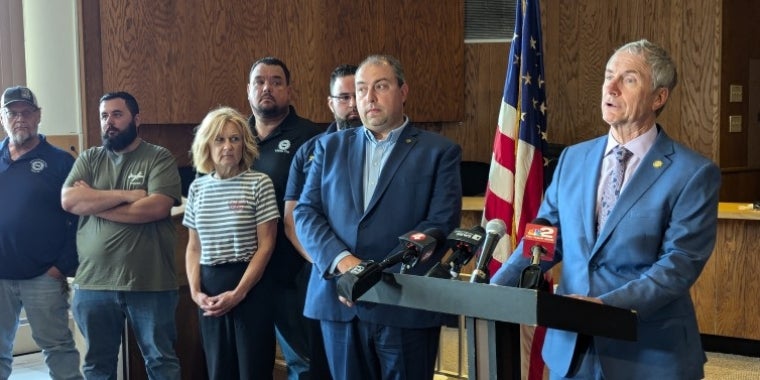
Senator Sean Ryan Passes Bill To End Exorbitant Late Fees For Property Taxes
June 28, 2024

Senator Sean Ryan and Amherst Town Supervisor Brian Kulpa discuss S.967A at a press conference at Amherst Town Hall, June 28, 2024
AMHERST, N.Y. – Today, June 28, 2024, New York State Senator Sean Ryan announced that his legislation (S.967A) to reduce delinquent property tax interest rates has passed both houses of the New York State Legislature. The bill changes the guidelines dictating the amount of interest counties may charge homeowners who are behind on their property taxes. It would ensure that property tax interest rates remain appropriate regardless of changing economic conditions. The legislation now awaits Governor Kathy Hochul’s signature.
State law currently sets the minimum interest rate a municipality can charge for delinquent property taxes at 12% annually and some counties – including Erie County – charge as much as 18%. The new legislation would remove the 12% minimum and institute a maximum allowable rate. The new cap would be adjusted every five years to match the federal prime interest rate but could never exceed 16%. Municipalities would only be required to change the rate they charge if the maximum allowable rate falls below what they are currently charging.
The current 12% floor was introduced in 1983 in the midst of a five-year stretch that represented the highest prime rates in the nation’s history. Though the prime rate has not exceeded 12% since October 1984, the minimum allowable rate for delinquent property taxes has never been adjusted. As a result, for four decades municipalities have been required to charge interest rates that have been disconnected from each era’s economic conditions, and often comparable to credit card interest rates.
Exorbitant interest rates make it difficult for homeowners who get behind on their property taxes to catch up again, contributing to a cycle of debt and poverty for low-to-moderate income homeowners. In research done in conjunction with the Western New York Law Center in 2021, High Road Fellow Hannah Drexler of Cornell University found that 20% of homeowners who owed back-property taxes in Erie County’s low-to-moderate income zip codes owed more in interest than they did in back taxes. On average, interest accrued made up 41% of the total amount owed by these homeowners.
Lowering the interest rate to a more appropriate level will make it easier for New Yorkers to resolve their tax delinquencies and avoid foreclosures. Doing so will provide families with much-needed stability and help protect homeowners from getting stuck in a perpetual cycle of debt, enabling them to build generational wealth. It will also be beneficial to homeowners who are not behind on their property taxes – studies have found that having even one delinquent property in a neighborhood leads to decreased property values for nearby homes.
Senator Sean Ryan said, “For an entire generation of homeowners in New York, excessive interest rates on property taxes have meant that even a minor financial setback can have major ramifications for their future wealth. Doing away with these exorbitant interest rates will keep people out of cycles of debt that can be difficult to escape. Importantly, it will also help keep neighborhoods vibrant by keeping homes on the tax rolls and reducing the number of zombie properties popping up in cities across the state.”
Assemblymember Karen McMahon said, “Homeownership is a major milestone in people’s lives, and a key piece of the American dream. This legislation is going to help homeowners and families by allowing those who are behind on property taxes to get back ahead of the curve again. This is going to make owning a home easier in New York State, while also easing the minds of those in stressful financial situations. It will also help our communities grow and thrive by reducing zombie properties. I’m proud to have helped this legislation pass in the Assembly.”
Amherst Town Supervisor Brian Kulpa said, “I want to thank Senator Ryan for this legislation that protects taxpayers while recognizing the important process through which municipalities collect taxes for our operating budgets. With this bill, we can help taxpayers better navigate a difficult situation without impacting the Town’s tax collection efforts. Taxpayers are still responsible to pay their debt, but this bill recognizes the greater harm caused by excessive interest rates.”
